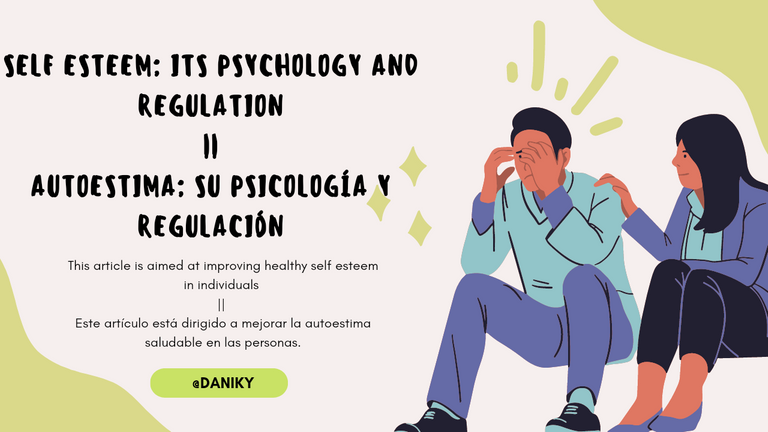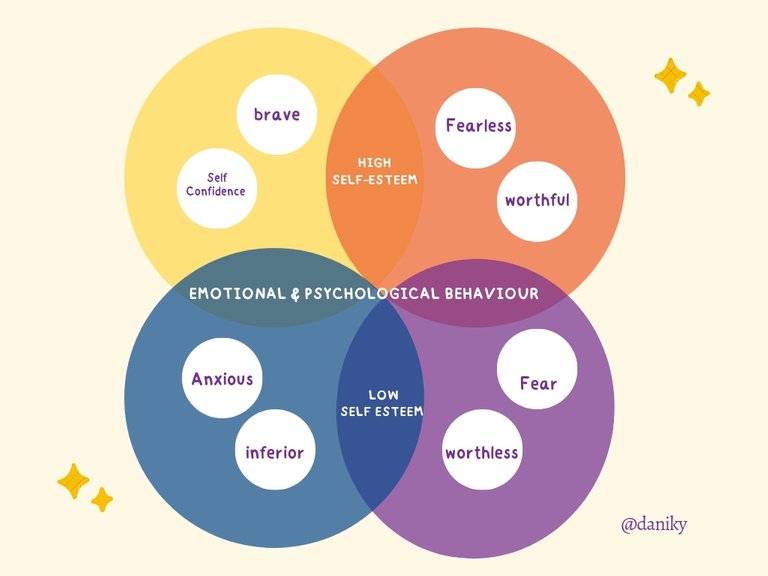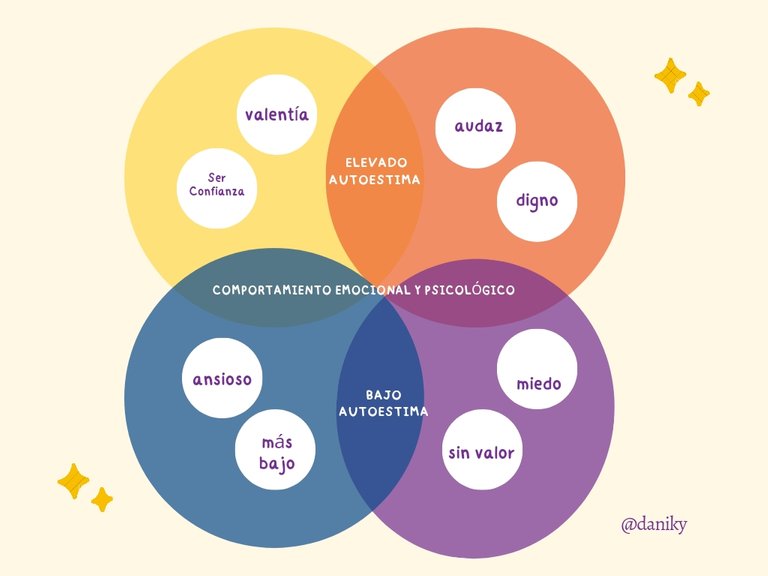
Self-esteem is an evaluation of one's own self-worth and can be influenced by a variety of factors, including past experiences, social comparisons, and cultural norms. It is a crucial aspect of one's psychological well-being and can have a significant impact on a person's mental health and overall quality of life.
People with high self-esteem tend to have a positive view of themselves and their abilities, and they feel confident in their decisions and actions. On the other hand, low self-esteem can lead to negative thoughts and feelings about oneself, and can cause a person to doubt their abilities and decisions.
There are many different theories about the psychology of self-esteem, but one common view is that it is formed through our early experiences and the messages we receive from others about ourselves. Our self-esteem can also be affected by our social comparisons to others and the cultural norms and values we are exposed to.
Low self esteem and high self-esteem

Low self-esteem and high self-esteem are two ends of a spectrum of self-worth.
Low self-esteem is characterized by a lack of confidence and a negative view of oneself. People with low self-esteem may doubt their abilities and decisions, and may feel inadequate or unworthy. Low self-esteem can lead to a variety of negative outcomes, including depression, anxiety, and difficulty forming and maintaining healthy relationships.
High self-esteem, on the other hand, is characterized by confidence and a positive view of oneself. People with high self-esteem believe in their abilities and value themselves. High self-esteem can lead to positive outcomes, such as better mental health and more successful relationships.
Boosting Low Self-Esteem
Low self-esteem can be a difficult issue to deal with, but there are things you can try to help boost your self-esteem. Here are a few suggestions:
Practice self-care: Take good care of yourself physically and emotionally. Exercise regularly, eat well, and make time for activities you enjoy.
Set realistic goals: It's important to challenge yourself, but setting unrealistic goals can set you up for failure. Aim to set goals that are achievable and rewarding.
Take small steps: Instead of trying to tackle a major goal all at once, break it down into smaller steps. This can help you feel more in control and give you a sense of accomplishment as you make progress.
Surround yourself with supportive people: Seek out relationships with people who are positive and supportive. Surrounding yourself with people who believe in you can help boost your self-esteem.
Seek help when needed: If you're struggling with low self-esteem, it may be helpful to talk to a mental health professional. They can help you identify the causes of your low self-esteem and develop strategies to improve it.
High Self-esteem and Pride
Self-esteem and pride are related but distinct concepts. Self-esteem refers to an individual's overall evaluation of their own self-worth and value. Pride, on the other hand, is a feeling of satisfaction and accomplishment that results from personal achievements or the recognition of those achievements by others.
High self-esteem can lead to feelings of pride in one's accomplishments, but it is also possible to feel proud without necessarily having high self-esteem. For example, an individual with low self-esteem may still feel proud of a specific accomplishment, even if they do not have a generally positive view of themselves. On the other hand, someone with high self-esteem may not necessarily feel pride in their accomplishments if they do not value or recognize the importance of those achievements.
In general, pride can be a healthy and positive emotion when it is based on genuine accomplishments and is not excessive or arrogant. However, too much pride can lead to negative consequences, such as alienating others or making poor decisions. It is important to strike a balance and be mindful of how one's pride may affect others.
Regulating Self-esteem
It's important to strive for a healthy level of self-esteem that is not too high or too low. Too much self-esteem can lead to pride and arrogance, while too little can lead to low self-worth and negative feelings about oneself. Finding a balance is key to maintaining good mental health and well-being.
Moreso, it is important to work on maintaining a healthy level of self-esteem. This can involve seeking out positive experiences and relationships, setting realistic goals and challenges, and learning to accept and value oneself for who we are.
La autoestima es una evaluación de la propia valía y puede verse influenciada por una variedad de factores, incluidas las experiencias pasadas, las comparaciones sociales y las normas culturales. Es un aspecto crucial del bienestar psicológico de una persona y puede tener un impacto significativo en la salud mental y la calidad de vida en general de una persona.
Las personas con alta autoestima tienden a tener una visión positiva de sí mismas y de sus capacidades, y se sienten confiadas en sus decisiones y acciones. Por otro lado, la baja autoestima puede conducir a pensamientos y sentimientos negativos sobre uno mismo, y puede hacer que una persona dude de sus habilidades y decisiones.
Hay muchas teorías diferentes sobre la psicología de la autoestima, pero una opinión común es que se forma a través de nuestras primeras experiencias y los mensajes que recibimos de los demás sobre nosotros mismos. Nuestra autoestima también puede verse afectada por nuestras comparaciones sociales con los demás y las normas y valores culturales a los que estamos expuestos.
Baja autoestima y alta autoestima

La baja autoestima y la alta autoestima son dos extremos de un espectro de autoestima.
La baja autoestima se caracteriza por la falta de confianza y una visión negativa de uno mismo. Las personas con baja autoestima pueden dudar de sus habilidades y decisiones, y pueden sentirse inadecuadas o indignas. La baja autoestima puede conducir a una variedad de resultados negativos, que incluyen depresión, ansiedad y dificultad para formar y mantener relaciones saludables.
La autoestima alta, por otro lado, se caracteriza por la confianza y una visión positiva de uno mismo. Las personas con autoestima alta creen en sus capacidades y se valoran a sí mismas. Una alta autoestima puede conducir a resultados positivos, como una mejor salud mental y relaciones más exitosas.
Estimulando la Baja Autoestima
La baja autoestima puede ser un problema difícil de tratar, pero hay cosas que puede intentar para ayudar a aumentar su autoestima. Aqui hay algunas sugerencias:
Practique el autocuidado: Cuídese bien física y emocionalmente. Haga ejercicio con regularidad, coma bien y tómese un tiempo para las actividades que disfruta.
Establezca metas realistas: es importante desafiarse a sí mismo, pero establecer metas poco realistas puede llevarlo al fracaso. Trate de establecer metas que sean alcanzables y gratificantes.
Da pequeños pasos: en lugar de tratar de abordar un objetivo importante de una sola vez, divídelo en pasos más pequeños. Esto puede ayudarlo a sentirse más en control y darle una sensación de logro a medida que avanza.
Rodéate de personas solidarias: busca relaciones con personas positivas y solidarias. Rodearte de personas que creen en ti puede ayudarte a aumentar tu autoestima.
Busque ayuda cuando sea necesario: si tiene problemas con la baja autoestima, puede ser útil hablar con un profesional de la salud mental. Pueden ayudarlo a identificar las causas de su baja autoestima y desarrollar estrategias para mejorarla.
Alta Autoestima y Orgullo
La autoestima y el orgullo son conceptos relacionados pero distintos. La autoestima se refiere a la evaluación general de un individuo de su propia valía y valor. El orgullo, por otro lado, es un sentimiento de satisfacción y logro que resulta de los logros personales o del reconocimiento de esos logros por parte de otros.
Una alta autoestima puede conducir a sentimientos de orgullo por los propios logros, pero también es posible sentirse orgulloso sin tener necesariamente una alta autoestima. Por ejemplo, una persona con baja autoestima puede sentirse orgullosa de un logro específico, incluso si no tiene una visión general positiva de sí misma. Por otro lado, alguien con alta autoestima puede no sentirse necesariamente orgulloso de sus logros si no valora o reconoce la importancia de esos logros.
En general, el orgullo puede ser una emoción saludable y positiva cuando se basa en logros genuinos y no es excesivo ni arrogante. Sin embargo, demasiado orgullo puede tener consecuencias negativas, como alienar a los demás o tomar malas decisiones. Es importante lograr un equilibrio y ser consciente de cómo el orgullo de uno puede afectar a los demás.
Regulación de la autoestima
Es importante luchar por un nivel saludable de autoestima que no sea demasiado alto ni demasiado bajo. Demasiada autoestima puede conducir al orgullo y la arrogancia, mientras que muy poca puede conducir a una baja autoestima y sentimientos negativos sobre uno mismo. Encontrar un equilibrio es clave para mantener una buena salud mental y bienestar.
Además, es importante trabajar para mantener un nivel saludable de autoestima. Esto puede implicar buscar experiencias y relaciones positivas, establecer metas y desafíos realistas y aprender a aceptarse y valorarse a uno mismo por lo que somos.

Gracias por tu tiempo. Espero que encuentres esta publicación interesante y también, no olvides votar mi publicación. Su reblogueo, comentario y seguimiento serán bien apreciados.


The rewards earned on this comment will go directly to the people( @daniky ) sharing the post on Twitter as long as they are registered with @poshtoken. Sign up at https://hiveposh.com.
Congratulations @daniky! You have completed the following achievement on the Hive blockchain And have been rewarded with New badge(s)
Your next target is to reach 57000 upvotes.
You can view your badges on your board and compare yourself to others in the Ranking
If you no longer want to receive notifications, reply to this comment with the word
STOPTo support your work, I also upvoted your post!
Check out our last posts: